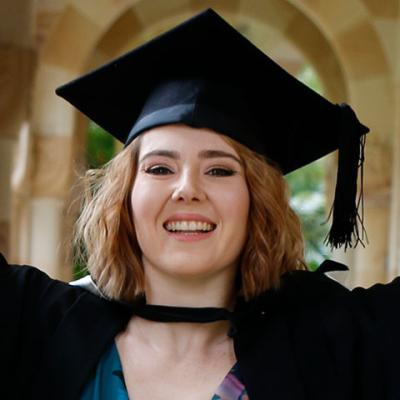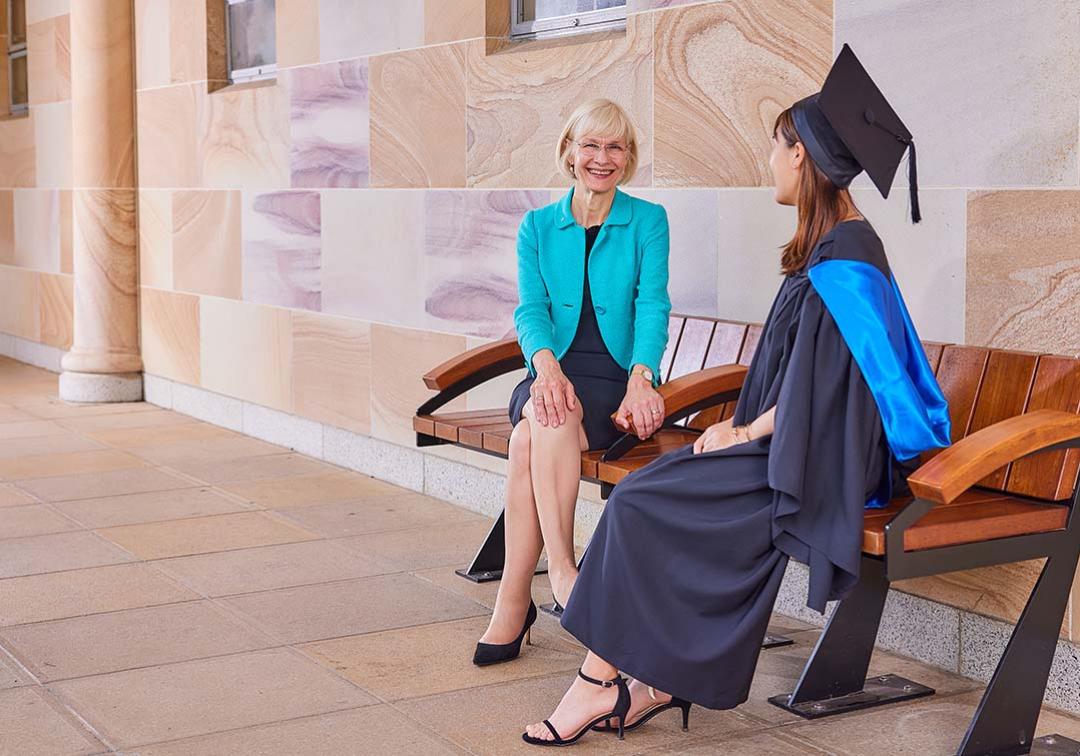
Bachelor of Journalism
Overview
Communicate local, national, and global stories through traditional and emerging media platforms.
Journalists tell important and impactful stories with a diverse skill set: writing, taking photographs, composing audio and video, developing interactive websites and much more. As a journalist, you will use powerful storytelling techniques to give a voice to local and global issues.
Using UQ's state-of-the-art production facilities, you'll extend your theoretical knowledge by gaining sought-after skills in field recording and camera work, sound editing, vision and pictures, data analysis, publishing and entrepreneurialism, and multi-platform distribution.
You'll also gain valuable insights into current production values and practices from the on-site Media and Production Support team, and industry professionals drawn from leading media outlets.
Despite the highly competitive nature of journalism, UQ graduates have high success rates in securing jobs across the media – in metropolitan and national newspapers, commercial and public radio and television, news agencies and magazines in Australia and around the world, with many now in senior positions.
Program highlights
- Learn production and editing using state-of-the-art facilities, combining creative storytelling with technical skills
- Graduate with the resourcefulness and skills to simultaneously report online, on-air, in writing, and across social platforms
- Explore new digital frontiers in journalism, drawing on interviews, complex data analysis, observation, and research to produce rich media content
- Undertake internships through partnerships with major national and international media outlets
How you'll learn
Your learning experiences are designed to best suit the learning outcomes of the courses you choose.
- Lectures
- Tutorials
- Work placements
- Overseas study
- Fieldwork
- Workshops
What you'll study
At UQ, degrees are called 'programs' and subjects are called 'courses'. Here's a sample of the courses you could study in this program:
- Media and Society
- Multimedia
- International Journalism & Mass Communication
- Journalistic Narratives
Dual programs
Double your skills and your opportunities with a dual degree. You can study the Bachelor of Journalism as a part of these dual programs:
Career possibilities
Our programs prepare you for your first job and beyond. Here are some of the careers you could be on your way to:
- Journalist
- Digital content producer
- Social media manager
- Photographer
- Broadcaster
- Content writer
- Public relations coordinator
- Camera operator
Next steps after graduation
Graduates currently work for metropolitan and regional affiliates of the ABC, News Corp Australia, Nine Co., AAP, APN, Prime Media, community media and more, across print, web, TV, radio, and emergent media platforms.
Events
See all events
29 June
Voyages to the Underworld: UQ Centre for Western Civilisation Winter School
Stories
See all stories
Careers
Powering up: UQ programs fuel next generation of sustainable energy leaders
5-minute read
Stories
See all stories
Careers
Powering up: UQ programs fuel next generation of sustainable energy leaders
5-minute read
Entry requirements
Prerequisites
- General English subject (Units 3 & 4, C).
Prerequisites
- General English subject (Units 3 & 4, C).
Entry score threshold
| ATAR / Rank | IB |
|---|---|
| 78 | 29.5 |
These are the lowest adjusted scores we made an offer to in Semester 1, 2025. Entry scores are based on the most recent Semester 1 intake and are updated in April each year. Meeting the entry score threshold doesn't guarantee admission.
Guarantee your place at UQ: If you meet our guaranteed minimum ATAR you could secure an offer for your preferred program.
English language requirements
IELTS overall 6.5; reading 6; writing 6; speaking 6; listening 6. For other English Language Proficiency Tests and Scores approved for UQ
TOEFL iBT (including Paper Edition) - Overall 87, listening 19, reading 19, writing 21 and speaking 19.
PTE Academic - Overall Score of 64 and 60 in all sub bands.
BE - A minimum overall grade of 4 plus a minimum grade of C in all macro skills.
CES - Overall 176 and 169 in all sub bands.
OET is not accepted.
There are other ways to meet the English language requirements. For some programs, additional conditions apply.
Student visas
International students who are accepted into full-time study in the Bachelor of Journalism are eligible to apply for an Australian student visa (subclass 500).
There are a number of requirements you must satisfy before a visa is granted, including the Genuine Student (GS) requirement.
Entry score range
This table shows the range of entry scores for recent secondary students offered a place in the B Journalism for Semester 1, 2025
| Without adjustments | With adjustments | |
|---|---|---|
| Highest | 99.5 | 99.5 |
| Median | 88.7 | 91.3 |
| Lowest | 76.7 | 79.4 |
Who you'll study with
Here's a snapshot of our student intake for this program in Semester 1, 2025:
| Applicant background | Number of students | Percentage of all students |
|---|---|---|
(A) Higher education study | <5 | <5 |
(B) Vocational Education and Training (VET) study | <5 | <5 |
(C) Work and life experience | 0 | 0% |
| (D) Recent secondary education | ||
| 13 | 59.1% |
| 0 | 0% |
| 0 | 0% |
International students | <5 | <5 |
Total | 22 | 100% |
"<5" — The number of students is less than 5.
N/A — Students not accepted in this category.
N/P — Not published. The number is hidden to protect the privacy of students in other cells.
Need help meeting the entry requirements?
Fees and Scholarships
Indicative annual fee
Approximate yearly cost of tuition (16 units). Your fees will vary according to your selected courses and study load. Fees are reviewed each year and may increase.
$15,225
2026
Approximate yearly cost of tuition (16 units). Your fees will vary according to your study load. Fees are reviewed each year and may increase.
AUD $45,792
2026
Government assistance
Financial aid
As an international student, you might be eligible for financial aid – either from your home country, or from the Australian Government.
HECS-HELP
Domestic places in the Bachelor of Journalism are Commonwealth supported, as long as you meet all Commonwealth supported place eligibility requirements.
This means the cost of your education is shared between you and the Australian Government. Instead of tuition fees, Commonwealth supported students pay what are called student contribution amounts.
If you have a Commonwealth supported place, you may also be eligible for HECS-HELP. This is an Australian Government loan scheme to assist eligible students with the cost of their student contribution amounts.
Centrelink support
The Australian Government offers a number of income-support payments to eligible Australian university students.
Scholarships
You may be eligible for more than 100 scholarships, including:
How to apply
Applying online
If your senior schooling is from outside Australia, you can submit your application to UQ. Or, if you prefer, you can use an approved UQ agent near you.
The program code for the Bachelor of Journalism is 2040.
How to apply for undergraduate study
If your senior schooling is from Australia
Submit your application to the Queensland Tertiary Admissions Centre if you're an international student who is currently studying:
- Australian Year 12 (in Australia or another country), or
- the International Baccalaureate in Australia.
The QTAC code for the Bachelor of Journalism is 737001.
Applying through QTAC
All domestic applications should be submitted to the Queensland Tertiary Admissions Centre (QTAC).
The QTAC code for the Bachelor of Journalism is 737001.
Important dates
If you’re studying Year 12 in Australia, go to the QTAC website to check the closing date for this program.
If you’re applying to UQ, the closing date for this program is:
- To commence study in semester 2 - May 31 of the year of commencement.
- To commence study in semester 1 - November 30 of the previous year.
Visa processing times vary. Apply and accept your offer as early as you can.
To learn more about UQ dates, including semester start dates, view the Academic Calendar.
Important dates
To check the closing date for this program, go to the QTAC website.
To learn more about UQ dates, including semester start dates, view the Academic Calendar.
Admissions schemes
Applying to university can be both exciting and daunting, which is why we’ve tried to make the process as simple as we can.
We have several schemes in place to improve your chances of getting a place at UQ.
Pathway options
A rank or score doesn’t determine your potential.
If you're not offered a place in your first-choice program – or if you don't meet the entry requirements – you still have a number of options.
Aboriginal and Torres Strait Islander applicants
For support with applying – or if you have any questions about university life – get in touch with our Aboriginal and Torres Strait Islander Studies (ATSIS) Unit.
Explore other programs
Express yourself. And your interest.
They say choosing a degree is hard, which is why we've made it easy. Register your interest and we'll send you everything you need to know about applying to UQ.









